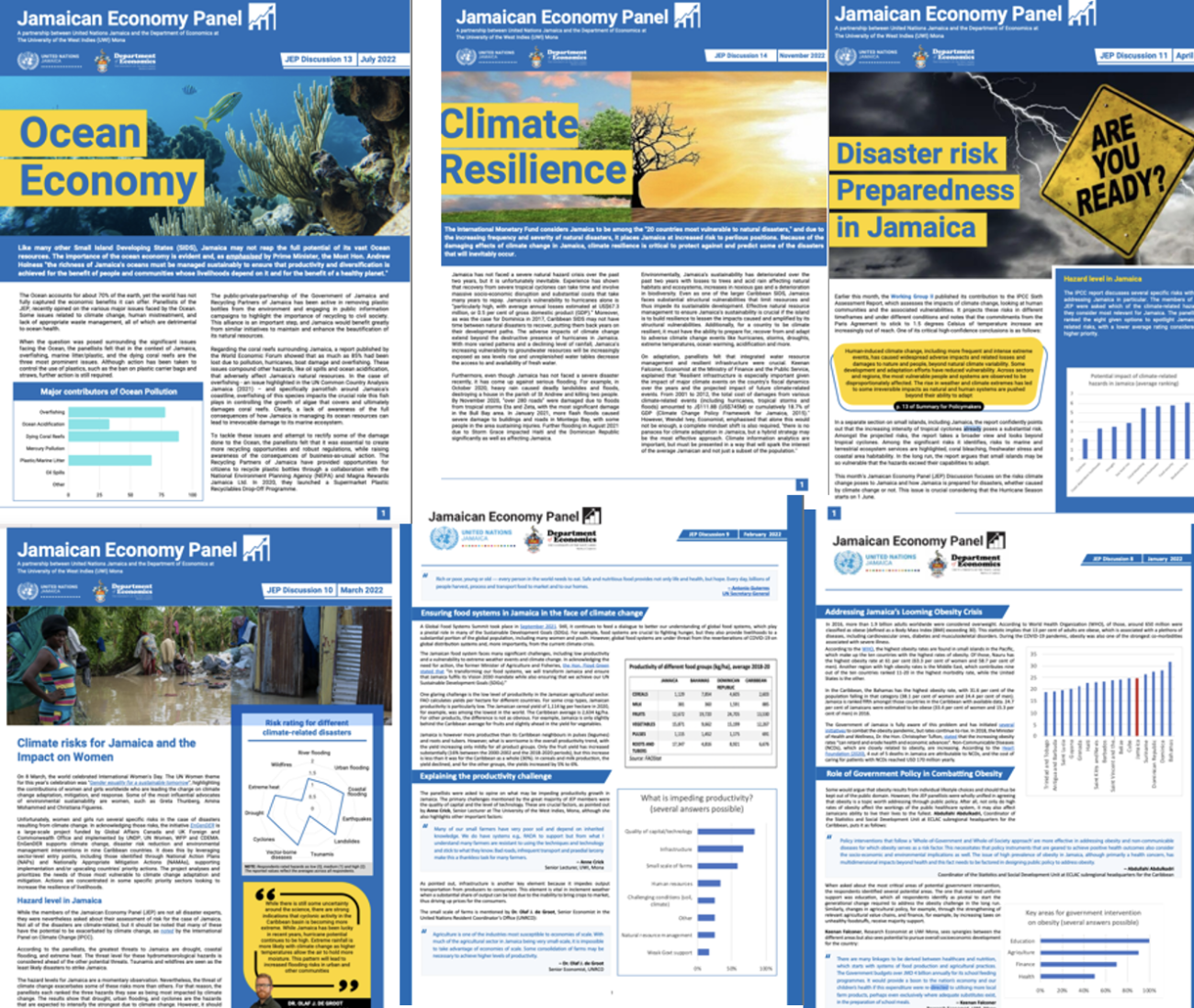Jamaican Economy Panel Rounds Up A Year of Adding Value to Economic Conversation

The JEP is a product of the UN Resident Coordinator's Office (UNRCO) valued partnership with the Economics Department of The University of the West Indies.
The Jamaican Economy Panel (JEP) has become a cornerstone upon which socio-economic issues can be sounded, reasoned, and rationalised – with a particular ear for a general population audience. The opinions shared have enriched understanding of the development space that the family of UN Agencies, Funds and Programmes occupy or can indeed step into as the United Nations works to support economic transformation and resilience building for Jamaica.
Over the last year, the JEP has covered a wide range of themes, from the Looming Obesity Crisis, Food Systems and Climate Change, Climate Risks for Jamaica and the Impact on Women, Climate and Disaster Preparation, Stigma, Discrimination, and Violence against Vulnerable and Marginalised Groups in Jamaica, Ocean Economy, Climate Resilience to lastly, the Creative Economy. This December issue takes stock of the critical points flagged by our Panel and the recommendations raised
Jamaica's Looming Obesity Crisis:
This survey highlighted that Jamaica must tackle obesity through comprehensive policy in all contexts. Panellists agreed that addressing obesity through public policy is needed. Although tax policy is generally one of the most convenient go-tos for affecting people's behaviours, tax on unhealthy behaviours is likely to be highly regressive. Therefore, panellists felt that using public funds to provide a more balanced (and locally sourced) diet in schools can affect behavioural change without the negative impact of regressive taxation.
Food Systems and Climate Change:
JEP panellists felt that even though global food systems are a critical part of everyday life, they receive minimal attention. In Jamaica, the agricultural sector is responsible for 16% of employment and provides substantial earnings through exports. Most importantly, the agricultural sector provides the food we all eat daily. Nevertheless, the Jamaican agricultural industry faces some considerable challenges, especially related to its low level of productivity. More significant investment in technology and skills and the pursuit of economies of scale would help increase the sector's level of productivity. This recommendation is critical in light of climate change, which has already started affecting agricultural output in the country, mainly through the deterioration of infrastructure. In the future, the panellists agreed that providing more support to farmers to improve their agricultural management skills further and teach them to consider the changing climate is crucial. Improving access to finance for farmers will support those who want to invest in upgrading technology and infrastructure, thus increasing the sectors' climate resilience.
Climate Risks for Jamaica and the Impact on Women:
Many respondents felt that women and girls are affected differently by the risks of climate change. This view could be because many Jamaican women find themselves in entrenched positions such as single parents, heads of households, low-income jobs, or household and community responsibilities. To guarantee that women and girls are better included in developing strategies to reduce the impact of climate change, panellists agreed that giving them a seat at the table was the most vital tool. This move would ultimately ensure that Jamaica approaches its disaster responses with an appropriate gender lens.
Climate and Disaster Preparation:
The panellists for this JEP felt a need to access more financing to invest in climate adaptation, especially concerning coastal defences and water storage. They highlighted that opportunities exist worldwide to attract such investments through private and public funds. Furthermore, the panellists had mixed perceptions about different segments of Jamaican society's preparedness for a potential hurricane. Their views can be attributed to the lucky streak the country has enjoyed with no significant impacts in almost a decade. Nevertheless, Jamaicans must prepare for acute disasters. The panellists saw the Government's initiative to establish a catastrophe bond as a good step toward preparing for the potential financial impact of a hurricane. However, the panellists indicated that a larger bond size and additional instruments to mitigate risk might be desirable.
Stigma, Discrimination, and Violence against Vulnerable and Marginalised Groups in Jamaica:
The JEP felt that Jamaica had made progress in this area, however, Jamaica must double its efforts to tackle the structural drivers of exclusion. They endorsed protective legislation, stronger political will, effective human rights programming and monitoring, and the improved capacity of public and private sector organisations to promote, respond and treat human rights issues.
Jamaica is a party to several treaties and resolutions relating to human rights, which obligate the Government to protect and promote the rights of all persons without distinction. However, continued work is needed to improve the human rights situation for vulnerable and marginalised groups. Panellists highlighted that additional and accelerated efforts are needed in Jamaica to address stigma and discrimination. Such measures will ensure that everyone, regardless of their group, can live peacefully with dignity and rights and participate fully in governance, cultural life and the economy while achieving their fullest potential.
Ocean Economy:
Jamaica has made many attempts to overcome some of the foremost issues facing its ocean resources. However, panellists agreed that there remains a long way to go to ensure that blue economic transformation strikes the right balance between optimising its commercial value and ensuring that Jamaica's Ocean resources sustain for future generations. The JEP emphasised that everyone has a responsibility and role in achieving this. As Jamaica evolves from the devastating effects of COVID-19, effective recovery must include blue economic transformation. Panellists highlighted that the planning for post-covid recovery provides a significant and unique opportunity to reset and chart a new course to build forward better in this decade of action and champion blue economic transformation.
Climate resilience:
Panellists agreed that increased cooperation and partnerships between the government and civil society, International Financial Institutions, and the private sector would expedite climate resilience in Jamaica. The JEP emphasised that it is necessary to understand better the trade-offs they face to best achieve blue transformation for Jamaica. Finally, panellists concluded that it was essential to adopt a multistakeholder approach as it would further promote collaboration and unity around policies to counteract the effects of climate change in Jamaica.
The Next Issue of the JEP looks at Jamaica’s Creative Economy
It is evident from the overview above that the panellists have come together to offer recommendations for some of the most complex issues facing Jamaica. However, we must examine what the future holds for the JEP. What is clear is the immense scope and opportunity to build upon our partnership with the University of the West Indies and increase our visibility and impact amongst civil society and on the government level. To better understand how we can achieve this, we asked the panellists what areas they would like to see addressed in 2023, how the JEP can be more impactful, and how the JEP can get better engagement.
Panellists felt that issues surrounding health and wellness were critical as Minister of Health and Wellness, Dr. the Hon. Christopher Tufton highlighted the economic burden of non-communicable diseases, many of which are a result of lifestyle. Panellists emphasised the need to address the economics of crime as well as effective strategies to reduce it. It was also suggested that we examine the effect of the triple crisis (finance, food and climate) on Jamaica. In addition to this, JEP panellists emphasised the need to address areas of green, blue and circular economic opportunities for local communities as well as examine ways to formalise the informal economy. Lastly, panellists suggested more specific topics such as industrial policy and large-scale emigration.
Regarding becoming more visible and gaining traction, the participants felt that increased visibility through sharing the results via social media and collaborating more with media outlets such as The Gleaner and Observer could create quick discussions and debates on specific topics. Another participant suggested sending out a survey to civil society to gain insight into the current issues being debated at the local level. Furthermore, some panellists suggested offering specific policy briefs, guided by the responses, aimed at policy- and decision-makers.
As a way of connecting all of these discussions, the UN hosted a partnership forum on the occasion of the 60th anniversary of Jamaica's membership in the United Nations and the 60th Independence anniversary. The conference brought together members of the government, private and third sectors, civil society and academia. The high-level panel discussions on some of the issues brought forward by the JEP underscore the essential role of innovative partnership opportunities in reaching sustainable development goals through this type of engagement. In addition to this, Elliot Harris, Assistant Secretary-General for Economic Development and Chief Economist, made special remarks about the creative economy.
Please find the link here for the recording of the United Nations Partnership Forum 2022.
Written by


















